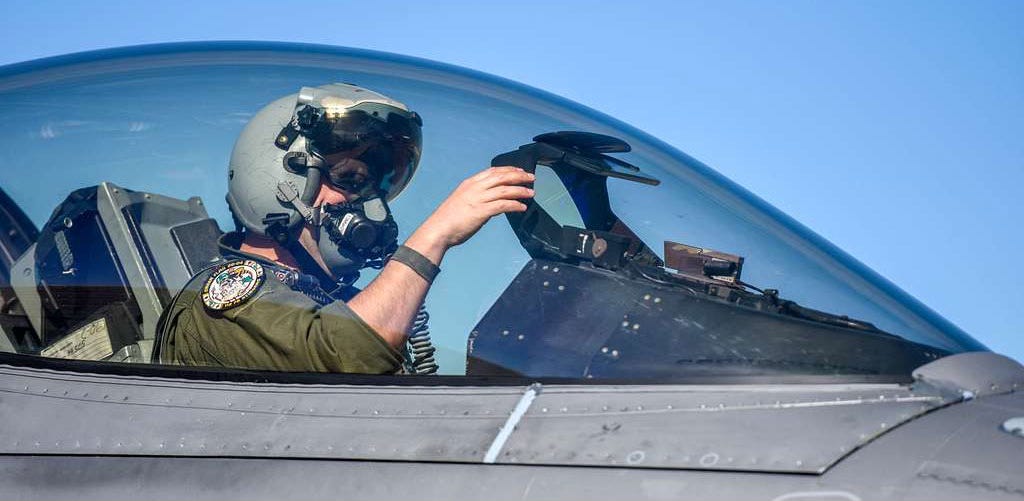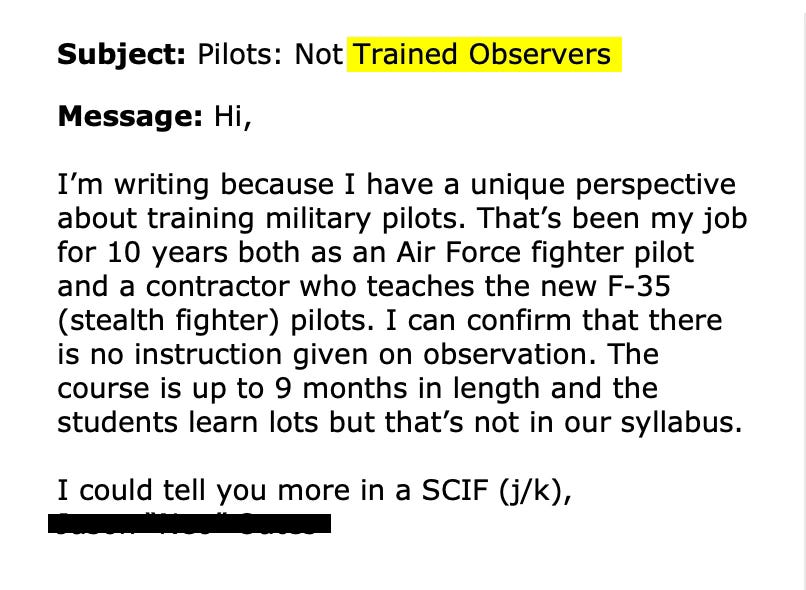Pilots are actually terrible at identifying things in the sky
One of the UFOlogists' most common arguments is that pilots' perceptions are superior to anyone else's, and it just ain't so.
Thank you for reading my newsletter about separating reality from bullshit in pop culture. Monday editions are free; Tuesdays and Thursdays are for paid subscribers only.
One of the great heroes of UFOlogy is the late astronomer J. Allen Hynek, who, early in his career, fell into being the US Air Force’s top guy at investigating their UFO reports. When a pilot reported something weird, Hynek got the bat signal; and as a result, he became probably history’s #1 most experienced person at investigating UFOs and interviewing the eyewitnesses firsthand. He’s also someone I personally have a lot of admiration for — that’s not to say he was perfect, nobody is — but obviously he had about the coolest damn job there is. Or was.
One of his findings is the one thing I wish I had included in The UFO Movie (now streaming) but did not. His finding directly confronted one of the most popular tropes among today’s UFO fans: the belief that military pilots are “trained observers” who cannot be mistaken about the things they perceive in the sky. When I was making the movie, I was somewhat hampered by the fact that active duty pilots, and many civilian contractors, are not free to discuss their work. I did speak with two people whom I was unable to include in the film whose current job is training military pilots. One emailed me:
OK fair enough, military pilots do not receive any “observation” training, but shouldn’t it be true that just by the nature of their work, they’d automatically have some kind of superhuman “object identification” ability?
Hynek wondered this too. In his 1978 book The Hynek UFO Report, he described how he and his colleagues went through the entire archives of Project Blue Book looking for trends: when and where were UFOs reported the most, who reported them, and so on. One of the more interesting of his findings was that, when the occupation of the witness was given, pilots were the worst at misidentifying celestial objects. Not the best, not even average; the worst, concluding “Surprisingly, commercial and military pilots appear to make relatively poor witnesses.” He included this table in his book:
Any random “technical person” made fewer misidentifications than pilots. Hynek explained:
What we have here is a good example of a well-known psychological fact: “transference” of skill and experience does not usually take place. That is, an expert in one field, does not necessarily “transfer” his competence to another one.
Translation: “Good at flying a plane” does not equate to “good at identifying distant objects”.
Nevertheless, when you scroll through the YouTube comments for The UFO Movie you’ll find a huge percentage of the negative comments (from alien visitation believers) state that I ignored the unimpeachable testimony from great and respected military pilots like David Fravor (one of the pilots on the scene when the Tic Tac video was filmed). Well, I did ignore it for the movie because my movie is about astronomy, not about UFO tall tales; but I do wish I had included this additional data point about pilots in general.
This YouTube commenter (take that for what it’s worth) offers the following extra bit of color:
Makes sense; fighter jockeys have a million things more important to worry about than the inner workings of their camera. In the case of Fravor’s Tic Tac video, the camera was simply rotating a new optical pathway into position and causing the image to jump; Fravor insists the object jumped because it suddenly moved at incredible speeds — even though the numbers on the screen said in black and white the camera was just flipping a new lens into position.
This is not an indictment of Fravor or other pilots. We need them up there doing the thing they’re good at: countering the enemy. We don’t need them knowing about their imaging pod’s inner workings. One of Hynek’s “technical people” has a lot less on his mind at any given moment than a pilot in the air, and so it’s not unexpected that they can take a bit more time to analyze the reason for their perceptions.
Anyway, should there ever be a UFO Movie II: Electric Boogaloo, I may be able to include this. The error made by those who believe in the infallibility of pilots is not helpful to the public understanding of science.








As a pilot...
I totally agree with this.
I’ve had many experiences staring at something in the sky or on the ground and having WTF moments. And then having “Oh, duh” reactions as my brain finally makes some kind of recognition.
Leslie Kean claimed [and still believes] that UFOs exhibit signs of intelligence by behaving aggressively when encountering military pilots, but passively when encountering civilian pilots. A more common sense explanation is that pilots preferentially report random visual stimuli to behave the way they are TRAINED to expect.
Several years ago, I described the ‘questionable foundation’ of Leslie Kean’s book on pilots and UFOs as the naïve and unverified faith in pilot reports. She has insisted the UFOs show intelligent purpose based on their perception of the nature of their witnesses, since they are reported to behave differently when seen by military pilots than when seen by civilian pilots [when the more common-sense explanation is that different pilots report observations in terms of what they expect from their own different experience bases]. The data archives she touts as ‘unexplainable’ pilot sightings [such as the French ‘Weinstein Report’] can easily be shown to contain numerous pilot misinterpretations of unrecognized space and missile activity around the world, so who knows how many other prosaic explanations were never found by the ‘investigators’? See here:
https://web.archive.org/web/20190101223008/http:/www.nbcnews.com/id/38852385
https://web.archive.org/web/20190101223008/http:/www.nbcnews.com/id/38852385